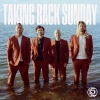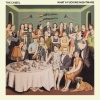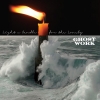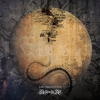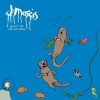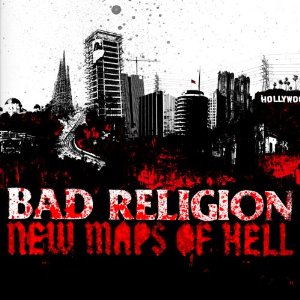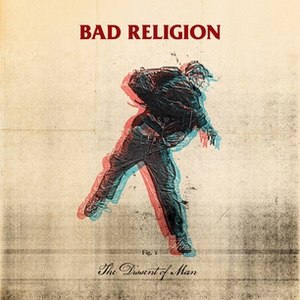Gig Reviews

Cult Leader
Stengade, Copenhagen, DEN - 15/4
Album Reviews
Bad Religion Discography: An Overview
Previous Nextauthor PP date 14/06/11
A couple of months ago we were approached by a reader who shall remain anonymous (reveal yourself in the comments if you so wish) who asked what I originally thought was a simple question: "Could you point me in the direction of the best Bad Religion albums? I'm planning on seeing them at Roskilde Festival this year and it's the perfect excuse to get properly acquainted with the band". Okay, so maybe those weren't his exact words, but nonetheless he was interested in a few recommendations from the mammoth discography that is the Bad Religion back catalogue. So we thought that he's probably not alone in simply not knowing where to start to discover and understand why many consider Bad Religion the greatest punk rock band to have existed throughout time. We all know the feeling of knowing a couple of songs from many a classic band who started in the 70s and 80s without having the slightest of clues as to where to begin dissecting a typically 10-20 album strong discography. The sheer amount of material is often so overwhelming that without having someone pointing you in the direction of the right releases, you might blindly choose one or two albums and end up with the weakest records from the band without knowing (think Metallica here, for example). Subsequently, you might be discouraged to check out any more and miss out on records that the people in the know consider some of the greatest albums ever written.
Because lets face it: oldest does not always equal best when it comes to timeless recording artists, even if it might be a good starting point in many cases. Which is why we figured it's a good idea to shed some light into the fifteen-album strong discography of Bad Religion with an article aimed at those who aren't already die-hard fans of the band, especially in light of their relevance to the Danish audience given their anticipated Roskilde Festival performance in a couple of week's time. So yours truly holed up for about a month's time to re-discover and re-listen the entire discography by Bad Religion to be summed up in a relatively short and concise fashion. The result is an article outlining the classics (or the albums that anyone reading this site should be in possession of), the quirky ones (or those best left for later absorption once you are already into the band), a recommended place to start from, and a few records to avoid altogether because they simply don't represent the band in the same light as the remainder of their discography. Because although the intuitive response might be "it's Bad Religion, pick any album, they're all good", the reality is a little more complex than that.
Oh, and we've embedded a 38-song mixtape featuring a selection of the best Bad Religion songs as a Grooveshark widget at the bottom of the article for your listening pleasure.
Bad Religion essentially has two seminal eras. The late 80s when they released three genre-defining releases in three years, and the rejuvenation era after the change of the millennium when Epitaph founder and original guitarist Brett Gurewitz re-joined the band after seven years of absence due to disagreements about the major label deal with Atlantic Records. In the latter part, they released what is in my biased opinion the very best Bad Religion album to date, "The Process Of Belief". It is, however, only a matter of personal preference, as all five albums stand among the best recorded in the history of punk rock, and should be a mandatory part of any serious music fan's record collection.
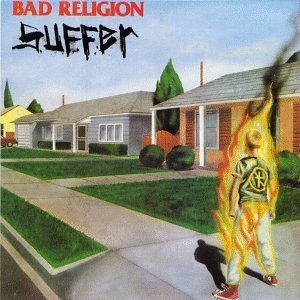 "Suffer" (1988)
"Suffer" (1988)
Although Bad Religion released two albums prior to "Suffer", this is where it really began. A perfect ten album containing some of the band's longest standing seminal classics that still receive regular airplay on radio stations and turn up as cover versions almost every year on some up-and-coming band's album. It's also the album most often quoted as the best Bad Religion album. Songs like the title track, "You Are (The Government)", "Give You Nothing", "Do What You Want", "Part IV (The Index Fossil)", or in fact all songs on the album, are what you call timeless classics. 23 years later and they don't sound dated at all. [10]
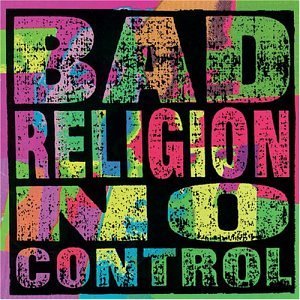 "No Control" (1989)
"No Control" (1989)
Where most bands fail to follow-up to such a monumental album that turns an entire genre upside down and influences bands two decades int he future, Bad Religion's next album, "No Control", is nearly every bit as good as the legendary "Suffer". It added more advanced guitar melodies and fortified the anthemic vocal harmonies that the band is renowned for, and laid the groundwork for moving away from the strictly hardcore-rooted punk rock of their previous work into a more melodic territory. Songs like the title track, "I Want To Conquer The World", and "You" among many others are still regarded as some of the best songs they have written to date. [9]
 "Against The Grain" (1990)
"Against The Grain" (1990)
Though still maintaining their gritty and aggressive onslaught of hardcore-rooted punk to an extent, "Against The Grain" sees the band adding some slightly quirkier elements to their sound by experimenting with vocal melodies. The result was an epic hit-parade the like of which most bands can't even dream about. The vast majority of older Bad Religion songs you might recognize come from this album, such as the title track, "21st Century (Digital Boy)", "Modern Man", "Flat Earth Society", "Anesthesia", "Entropy", "God Song", and "Walk Away". It's a perfect balance between their hardcore roots and the melodic aspect they single-handedly introduced into the genre. [9½]
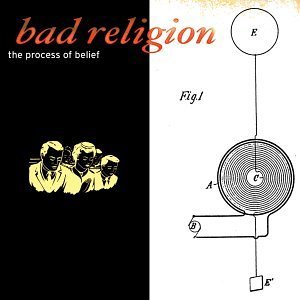 "The Process Of Belief" (2002)
"The Process Of Belief" (2002)
Bad Religion spent the majority of the 90s by releasing a flurry of releases of extremely mixed quality without coming close to their three album masterpiece streak of 1988-1990. Despite the return of Brett Gurewitz, few people expected them to bounce back as strongly as they did with "The Process Of Belief", unquestionably the best punk rock album from the last decade, perhaps even of all time, depending on who you ask. Just like "Against The Grain" 12 years earlier, it's one hit after the other from start to finish, featuring a large chunk of the songs that make up a modern Bad Religion live performance. Read my review for a more thorough description of why this is the best punk rock album released in the 2000s. [10]
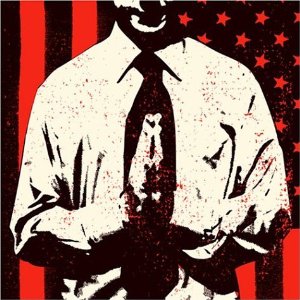 "The Empire Strikes First" (2004)
"The Empire Strikes First" (2004)
The follow-up to "The Process Of Belief" was always going to be as difficult as to "Suffer" in the early part of their career, but it turns out this band releases amazing records in chunks. The three-way guitar harmonies are almost equally as strong as on "Process", and the band continues their faster paced return to their roots, but with a cleaner, bigger sounding production and a rare instance where they have equally much mainstream appeal as they do underground credibility. Few bands ever achieve that equilibrium moment, but with radio hits like "Los Angeles Is Burning" standing on par with anthemic sing-a-longs in the vein of "Sinister Rouge" or "Atheist Peace", that's precisely what happened. And the band hasn't slowed down releasing great albums ever since. [9]
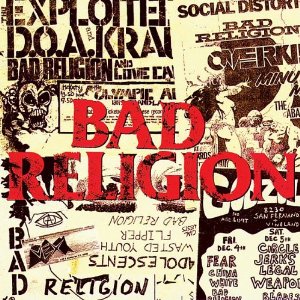 "All Ages" (1995)
"All Ages" (1995)
"All Ages" is a greatest hits collection documenting the band's best songs from their inception until 1992's "Generator". Basically, a best-of collection from some of the most influential and important records in punk rock all put together neatly into a 22-song compilation. This is the album that got me into Bad Religion: it's the perfect starting point for anyone not familiar with the band aside from a song or two. It doesn't have any bad songs, only classics, and good knowledge of this record alone will get you a long way into having a great time at any Bad Religion show, as well as arm you with ammunition to shoot down any "punk is dead" arguments from the 70s punk apologists. Once you've absorbed this baby, it's time to turn to the two other newer classics mentioned earlier in this article.
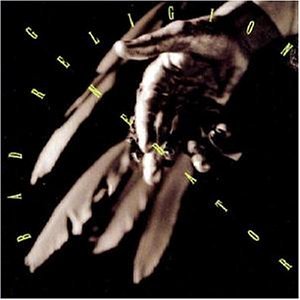 "Generator" (1992)
"Generator" (1992)
"Generator" presents a continuation of the sound from "The Gray Race", but with a few more experimental and slower parts thrown in for good measure, taking the band into a new direction. Chances are you probably haven't heard these tracks are the band's discography is so overwhelmingly strong elsewhere that some of these gems tend to be forgotten in the process. But there's no denying that "Generator", "No Direction", "The Answer" or "Atomic Garden" wouldn't be fantastic songs. Especially the first one is played virtually at every single Bad Religion concert regardless of venue or continent. That being said, it doesn't quite match its predecessors and is therefore rarely mentioned in the context of the classics, though there are a few people who maintain it should be. [7½]
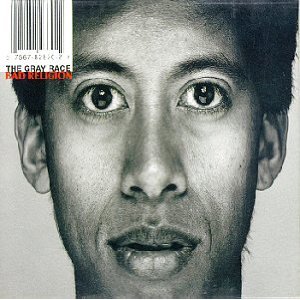 "The Gray Race" (1996)
"The Gray Race" (1996)
After the departure of Brett Gurewitz and a couple of questionable albums many were asking if Bad Religion would be able to write another good album without him. "The Gray Race" is proof that they can. One of the most famous and widely spread songs by the band, "Punk Rock Song", is found on this record, alongside "little known" tracks like "A Walk", "Come Join Us", "Them And Us", all of which are regularly cycled at Bad Religion concerts even in recent years. This is also the album where Bad Religion's guitars are at their cleanest, and the production at its finest, thanks to Atlantic Records recording budget and vocalist Graffin's desire to appeal to a wider audience at this stage. The sound of "The Process Of Belief", for instance, traces back to this album. [8]
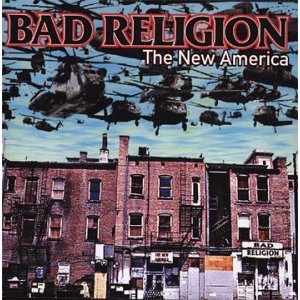 "The New America" (2000)
"The New America" (2000)
"The New America" is probably the least known album of the bunch I'm mentioning in this section. That's because it's often considered to be the weakest of their major label years, and the one where the band overdid the anthemic punk rock thing in places. And while you won't find many unforgettable sing-a-long moments on this record, nor songs you'll probably have ran across at some point in your life, it is still an important record because it's the only Bad Religion album which isn't politically or socially motivated. Greg Graffin had just dealt with a divorce, and takes a rare personal perspective into his lyricism, resulting in some of his most introspective and candid work to date. So if lyrics are your thing, this is the Bad Religion album to get. Check out "New America", "1000 Memories", and "A Streetkid Named Desire". [7]
This one is often referred to as the fastest and most aggressive Bad Religion album to date. It's considerably less catchy and features fewer choruses warranting echoing crowd participation at big festivals, but it's a throwback to their 80s albums and a reminder to naysayers that not all modern albums by this band are slow or mid-tempo. From the 52 second breakneck speed opener to the high-speed hardcore-rooted punk onslaughts, this is probably an album left to be checked out once you've discovered the anthemic side of the band first. Although with "Dearly Beloved" and "Heroes & Martyrs", that exists here, too. [8½]
The latest Bad Religion album is fairly similar to "New Maps Of Hell", but with a more structured, and some might argue predictable execution. There are the aggressive fast songs, a few anthems, and even some experimentation with bouncy vocal harmonies and stuff like that, which has been the bread-and-butter of this band for the last three albums or so. In retrospect I may have overrated the album by about half a grade or so, but with "The Resist Stance", "Wrong Way Kids" and "Someone To Believe" leading the way, it's too difficult to argue that "The Dissent Of Man" wouldn't be another excellent addition to the BR back catalogue. But like its predecessor, it's a record that beginners should leave for later discovery. [8½]
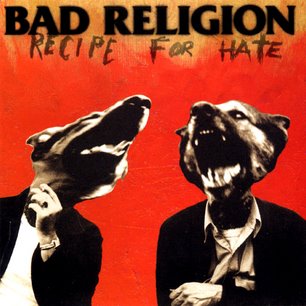 "Recipe For Hate" (1993)
"Recipe For Hate" (1993)
If you're feeling curious, you might be interested in checking out a couple of Bad Religion albums which divide fans into love/hate relationships. For some, "Recipe For Hate"'s songwriting saw BR evolve from just being a melodic hardcore band to something more challenging, but others long for the clean gang shouts and huge anthems that are largely missing from this record, claiming that it's too far away from the band's roots. I admit to enjoying a couple of tracks from this release, but compared to "Generator" before it, or the three masterpieces before that, "Recipe For Hate" feels a little bit like a let down. Other bands would be proud to own this as a part of their back catalogue, but for Bad Religion it feels like a step down from the standard we are used to hearing. But don't take my word on it, explore it yourself and decide for yourself.
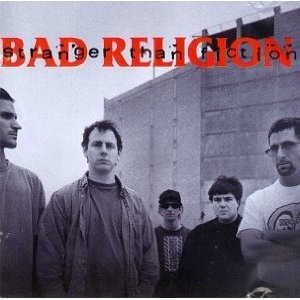 "Stranger Than Fiction" (1994)
"Stranger Than Fiction" (1994)
Whenever a successful independent label band signs to a major label, people are always going to be wary of their next release. "Stranger Than Fiction" is that album most of us hate to hear from our favorite bands, where the grit and rough edges of their classic guitar sound are cleaned up by a big production and an orientation towards more radio-friendly songs. With Gurewitz no longer in the band, the key riff-master behind the band is missing, leaving vocalist Graffin lacking their old dynamic for the first time on a record. He does a decent job on "Infected", "Incomplete" and "Tiny Voices", but I'd say this is a questionable album that leaves more to be desired. That said, I've heard others claim this as their favorite Bad Religion release, so I'm leaving it in the wild card section for the completionists to check out.
1. Into The Unknown (1983) - Universally disowned by Bad Religion fans, critics, and even the band itself. It's their horrific sophomore album which is so far away from the idea of a Bad Religion album that you would never recognize it to be the same band. The band actually disbanded due to how awful this album was, but luckily they re-grouped, and the wrote the album of their career in "Suffer" five years later.
2. No Substance (1998) - perhaps the most characteristic album of Bad Religion's mid to late 90s struggles without Gurewitz. The sound is all over the place and there are no real hits, and there's a general feeling that something's missing from the band. Turns out that something was Gurewitz. While "No Substance" might not be the mess that "Into The Unknown" was, it's still far inferior to the band's other output, or even to that of other bands during the melodic punk heyday of the same years, and one of the reasons why their mid 90s material is often not considered to be on par with the band's ability.
Credit for the main photo goes to renapunx.deviantart.com
 Twitter
Twitter Facebook
Facebook
